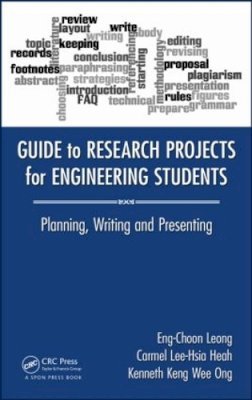Eng-Choon Leong is currently an associate professor at the School of Civil and Environmental Engineering, Nanyang Technological University, Singapore. He has more than 300 publications in international journals and conferences and is a recipient of the 2004 ASTM Best Practical Paper for Geotechnical Practice Award and of the 2012 Koh Boon Hwee mentor award. Carmel Lee-Hsia Heah is a senior lecturer at the Language and Communication Centre at Nanyang Technological University, Singapore and formerly a senior lecturer in professional communication at the Faculty of Pharmacy, University of Toronto, Canada. Her research interests include EL teaching and learning, ELT and engineering curriculum and course design and Language for Special Purposes. She has done significant research work in ELT pedagogy and course development as well as professional communication skills training. Her research output includes co-authored textbooks and an English grammar reference book. Kenneth Keng Wee Ong is a lecturer at the Language and Communication Centre at Nanyang Technological University, Singapore. He teaches courses at graduate and undergraduate level on research writing and technical communication. He has also received the Dean's Commendation for Research award in 2010 and 2011 conferred by the National Institute of Education, Singapore. His current research interests include bilingual language processing and semantic/conceptual representation, second language vocabulary acquisition and computer-mediated discourse analysis.
"Engineering students who have to complete research projects will find this book an immensely helpful reference to hone their skills throughout the whole project. Engineering project supervisors will also find it a great workload reducer if their students can use this volume to its full potential." —English for Specific Purposes, July 2016 "… comprehensive and covers every aspect of a research project. Students will also appreciate the concise chapters and easy-to-read text. And even if students do not use Microsoft Office, they will still benefit from the other well-written and informative content." —Technical Communication, February 2016 "… specifically caters to engineering students and provides a more than comprehensive coverage of not only the research process but provides tips on the writing process and also the presentation of the research conducted. The writers, having taught engineering students, are obviously aware of what these students require. However, although primarily aimed at engineering students, this volume will be of use to both undergraduate and postgraduate students working on research projects." —Maya Khemlani David, University of Malaya "… addresses the current need of a comprehensive guide for undergraduate students. … With its comprehensive approach and organizational clarity, the book should be able to come in handy for all students preparing a research report. Remarkably, the book includes specific advice on use of language and grammar that is bound to enhance the quality of student writing. A very welcome addition to books in this area!" —Dr Anil Pathak, Deputy Dean, Centre for Communication, Teaching and Learning, Institut Teknologi Brunei "This is a very useful and comprehensive book for undergraduate and postgraduate students facing the challenge of their first research project. Shaping an idea, make it happen, and being able to communicate achievements are difficult tasks. Even the most brilliant students tend to remain ‘trapped’ in one of the three stages identified by the authors, planning, writing, and presenting. This book is easy to read, has many practical examples, and is written in a straight-to-the-point style. It can be read from the start to the end or just consulted on any specific aspect where support is being sought." —Professor Alessandro Tarantino, University of Strathclyde "… this book is unique as it guides students from the initial stage of choosing a topic all the way to writing up the report to presenting it in front of an informed audience." —Dr Deng Xudong, Associate Professor, Centre for Communication Skills, Singapore Institute of Technology "…a useful research and writing companion handbook to help students cope with all the demands of completing a project of such a scale. … can be used as either a self-study guide or a textbook in final-year project writing courses." —Dr Becky Kwan, Associate Professor, Department of English, City University of Hong Kong "The authors deserve accolade for bringing to the fore key concepts essential to successful academic research and writing. It is an invaluable handbook that is written in accessible language with a clear purpose in mind: to guide students toward academic success. It is a must-have for supervisors who work with research students. It is also a reliable resource book for researchers, teachers, subject librarians, and those interested in engaging with academic research writing." —Professor Lawrence Jun Zhang, PhD, University of Auckland, New Zealand "…the approach and selection of the topics covered in the book are very comprehensive … from conception of ideas to final presentation of the research outcomes. This book should be a "must-have" for all beginners in research work. Veteran researchers will find this book a good and refreshing guide to produce more succinct research reports." —Associate Professor Woon Kwong Yip, Registrar, SIM University, Singapore "… comprehensive and covers every aspect of a research project. Students will also appreciate the concise chapters and easy-to-read text. And even if students do not use Microsoft Office, they will still benefit from the other well-written and informative content." —Technical Communication, February 2016

